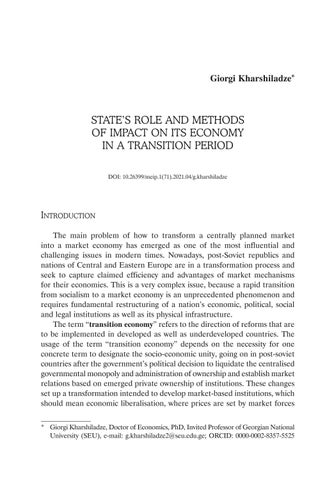Giorgi Kharshiladze*
STATE’S ROLE AND METHODS OF IMPACT ON ITS ECONOMY IN A TRANSITION PERIOD DOI: 10.26399/meip.1(71).2021.04/g.kharshiladze
INTRODUCTION The main problem of how to transform a centrally planned market into a market economy has emerged as one of the most influential and challenging issues in modern times. Nowadays, post-Soviet republics and nations of Central and Eastern Europe are in a transformation process and seek to capture claimed efficiency and advantages of market mechanisms for their economies. This is a very complex issue, because a rapid transition from socialism to a market economy is an unprecedented phenomenon and requires fundamental restructuring of a nation’s economic, political, social and legal institutions as well as its physical infrastructure. The term “transition economy” refers to the direction of reforms that are to be implemented in developed as well as underdeveloped countries. The usage of the term “transition economy” depends on the necessity for one concrete term to designate the socio-economic unity, going on in post-soviet countries after the government’s political decision to liquidate the centralised governmental monopoly and administration of ownership and establish market relations based on emerged private ownership of institutions. These changes set up a transformation intended to develop market-based institutions, which should mean economic liberalisation, where prices are set by market forces * Giorgi Kharshiladze, Doctor of Economics, PhD, Invited Professor of Georgian National University (SEU), e-mail: g.kharshiladze2@seu.edu.ge; ORCID: 0000-0002-8357-5525




